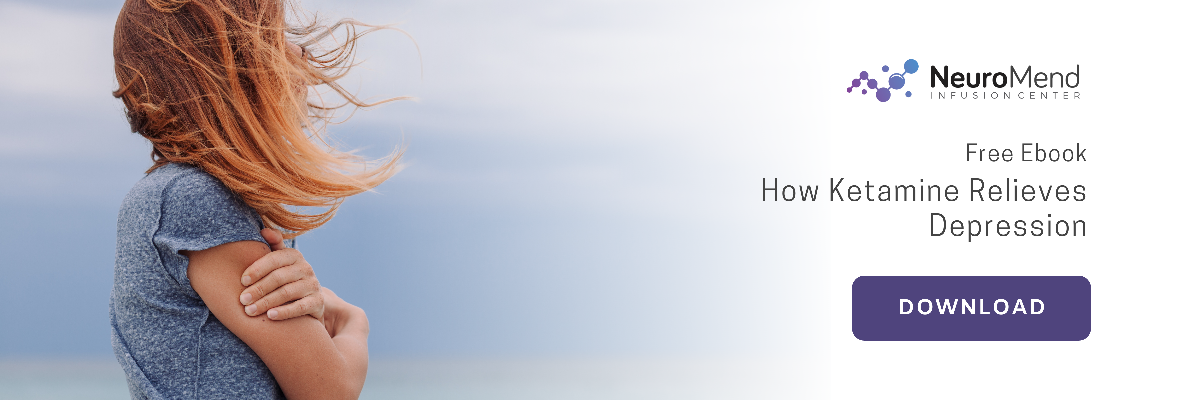
- Ketamine is emerging as a potential new drug for depression — the first of its kind in 35 years.
- Johnson & Johnson is actively pursuing a nasal formulation of the drug. Researchers plan to present the results of an advanced clinical trial of the formula next month at the American Psychiatric Association meeting.
- An early glimpse at some of the results suggests that the formula is safe and linked with sustained improvements in depressive symptoms over a year.
Ketamine, which has been called "the most important discovery in half a century," just got a step closer to becoming the first new drug for depression in 35 years.
The compound has a reputation as a party drug, but many experts say that's unfair, since ketamine is increasingly being studied for its potential use as a rapid-fire treatment for depression.
In people who live with the disease, thoughts of suicide can strike suddenly and without warning. Fast-acting, successful interventions are hard to come by. But a spate of recent research suggests ketamine infusions could provide quick and powerful relief — even to people whose depression has repeatedly failed to respond to other medications, as well as to individuals who are suicidal.
The promising studies on the treatment so far have come with one important caveat, however: the drug has to be taken intravenously, or via an injection, over roughly 45 minutes. That makes it a lot harder to get and take than a typical antidepressant pills such as Lexapro.
With that in mind, Johnson & Johnson company Janssen Research and Development has been actively pursuing the development of a formulation of the drug that would be safe and more convenient to administer. They're not alone: Allergan is in the last phase of clinical trials with a drug that acts on the same receptor as ketamine.
Yet Johnson & Johnson may be the furthest ahead in its research. The company received breakthrough therapy designation for its nasal formulation from the US Food and Drug Administration in 2016, an elite and competitive status that is designed to speed the drug through the complex federal approval process.
Earlier this month, the company shared some early results of a clinical trial of the nasal-spray formulation of the drug. The results suggest that the formula is well-tolerated by patients and linked with long-lasting improvements in depressive symptoms.
The promising science on ketamine
Ketamine's utility as an antidepressant has recently started to gain attention.
A recent study out of Columbia University Medical Center found that ketamine worked significantly better at curbing suicidal thoughts in depressed patients than a commonly used sedative.
A spate of other studies over the past several years have suggested that ketamine may provide swift and powerful relief to people suffering from some of the hardest-to-treat forms of depression — an illness that is the leading disability worldwide.
However, most studies of ketamine for depression have only lasted several weeks, which makes it difficult to say whether the drug has long-lasting potential. But Johnson & Johnson's clinical trial took place over nearly a year. Additionally, rather than addressing people's depression with ketamine alone, the researchers gave them the ketamine nasal spray along with an oral antidepressant.
Data from their clinical study — which used esketamine, the chemical mirror image of ketamine — suggest that patients tolerated the drug well. Most importantly, the treatment was also linked with sustained improvements in depressive symptoms over more than 11 months — making it one of the longest-lasting studies of ketamine to date.
"Janssen is committed to developing esketamine for treatment-resistant depression, a serious biological illness with high unmet need," Jaskaran Singh, Janssen's senior director of clinical research in its neuroscience therapeutics area, said during a presentation of the results on March 23 in Oxford.
Their research currently is focused on people with one of the hardest to treat forms of depression (known as treatment-resistant depression). But company representatives said that they also have plans to study the formula in adults and teens with major depressive disorder who are at imminent risk for suicide.
How ketamine is being administered now
After a 45-minute infusion of ketamine, clients at a ketamine clinic in Lafayette, La neighborhood are not partying.Instead, they're in a state of quiet contemplation — reclining on cushioned chairs, listening to music, or occasionally striking a tranquil yoga pose.
These clients are patients at one of the states ketamine clinics operated by NeuroMend Infusion Center, a network that offers the drug via intravenous injection to people diagnosed with severe forms of anxiety and depression.
While ketamine is a powerful dissociative that can induce feelings of being separated from one's own body, it is also one of the safest and most widely used legal anesthetics. Because the drug is federal approved for anesthesia, NeuroMend— along with an estimated 50 to 100 other providers across the US — are legally able to administer it for depression.
But using it for depression is considered "off-label" since that application of the drug is not outlined in its federally-approved designation. That means many patients must pay for the treatments out of pocket. Some insurance companies may reimburse some of the cost, but many do not. (Find out how to get insurance to pay for ketamine infusions here.)
A wave of hope from experts
Experts who study depression say they're onto something promising with ketamine. In a field that hasn't seen a new class of drugs in nearly four decades — and in which patients are often desperate and suicidal — that kind of sentiment holds a lot of weight.
"Imagine arriving in the emergency room with severe pain from a kidney stone — pain so bad that you can't think. You'll do anything to make it go away. And the doctors say, 'here's a drug that we've been using for 30 years, it works 50-60% of the time, and it should start to work in 4-6 weeks'" Cristina Cusin, a psychiatrist at Massachusetts General Hospital and an assistant professor at Harvard University, told Business Insider in March.
For someone who is suicidal, "that's currently the best we can do," she said.
Cusin co-authored a large recent review of the existing research on ketamine that was published in March in the Harvard Review of Psychiatry. Her findings shed light on the need for new treatments, but she also advises caution for patients.
"There's still enough there to be excited about its potential," she said.
Disclaimer: As of September 29, 2023, NeuroMend no longer offers Spravato treatments. We apologize for any inconvenience and encourage you to consult with our team or your healthcare provider for alternative options.
ABOUT NEUROMEND INFUSION CENTER
![]() We are an Evidence-Based Center of Excellence and the leading provider of Ketamine Infusions, IV Infusions and Ketamine Consulting Services for Ketamine Clinics and IV Therapy Clinics.
We are an Evidence-Based Center of Excellence and the leading provider of Ketamine Infusions, IV Infusions and Ketamine Consulting Services for Ketamine Clinics and IV Therapy Clinics.
We Provide Effective Treatment For The Following Conditions: Major Depressive Disorders, Post-traumatic Stress Disorder (PTSD), Bipolar Depression, Obsessive Compulsive Disorder, Suicidal Ideations, Chronic Migraines, Severe Anxiety, Fibromyalgia and Chronic Pain Syndromes.











